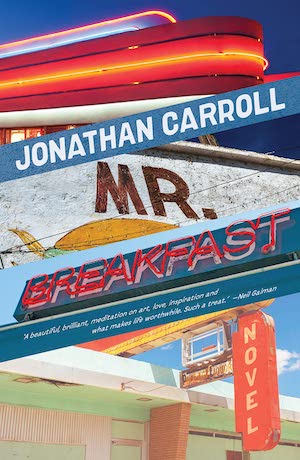The conventional wisdom is that Jonathan Carroll is a writer’s writer. That means that other writers heap praises on him, publishers don’t know what to do with his books, and too few readers discover him. His latest novel, Mr. Breakfast, was published in Poland way back in January 2019; it’s only now receiving publication in its author’s home country and in his first language. That four-year delay seems ominous: Can a book that went so long unpublished be worth the wait?
I’m glad to report that it’s another winner from one of our best fabulists.
In Carroll’s novels, art always changes the world, but there’s no guarantee that those changes will be for the best. In his first and most famous novel, The Land of Laughs, a deceased novelist’s words bring an imaginary town to sinister and dangerous life; in Mr. Breakfast, a magical tattoo lets a man inhabit three separate versions of his life.
Graham Patterson is at loose ends both personally and professionally: He’s given up his dream of being a comedian, he’s no longer holding a job, and the love of his life has left him. On a drive across the country, he stops in North Carolina to stay the night. For reasons he can’t entirely explain to himself, he’s struck by the artwork in the window of Anna Mae Collins’s Hardy Fuse tattoo parlor. “He had never seen anything like them before.” “It almost felt like the tattoos were speaking a whole new visual language to Patterson’s eyes and sensibilities.” The tattoos are the first shockingly new thing Patterson witnesses. They will not be the last.
Buy the Book


Mr. Breakfast
Shortly after receiving his tattoo, which shows “a bee inside the stomach of a frog inside the stomach of a hawk inside the stomach of a lion,” Patterson encounters a mohawked doppelganger, the Graham Patterson who cut his hair, honed his stand-up, and became the nation’s most popular comedian. The first Graham can see, hear, and follow the second Graham, but he cannot touch or interact with him. In the second Graham’s world, the first Graham is a sort of ghost, silent and invisible.
Shortly after Graham’s first encounter with his alternate life, Anna Mae Collins, the mysterious tattooist, shows up to explain the rules: Anyone who receives the “breakfast tattoo” can move at will between three distinct lives by tapping their tattoo and saying a code word. In Graham’s case, this codeword is “Pinecone,” the name of his childhood dog. There are only a limited number of switches that a person can make, and when they at last decide which life they’d like to live, their tattoo will vanish and they will forget about the tattoo and the magic. Anna Mae leaves Graham, who immediately begins his quest.
The life of “Graham 2” seems ideal, until it takes first a dangerous, then a tragic, and finally a farcical turn. After a kidnapping, death in a train crash, and an uncomfortable prehistoric reincarnation, Patterson knows for sure what life he won’t be picking. Life 3, in which Graham and Ruth reunite, seems at first blush almost too happy; Graham is almost afraid to return. So he continues in his first life, discovers a lucrative and satisfying career, and resolves not to choose.
Years pass by, but the tattoo’s magic demands a decision, and supernatural emissaries return to warn Graham that he must make a final choice or face disaster.
Carroll is compared with Haruki Murakami almost as often as he’s called a writer’s writer, but the comparison makes intuitive sense. Like Murakami, Carroll is a magical realist, rather than a systematizer or a worldbuilder: The rules of magic and the logic of the supernatural matter less than the mysteries of the heart. Graham Patterson and the people he encounters would be interesting even without the tale’s supernatural appurtenances. Also like Murakami, Carroll has a set of recurring motifs or emblems. Bull terriers are to Carroll what cats are to Murakami, so it’s hardly a surprise when the dog pops in to Mr. Breakfast. As is by now traditional, Films and music are reverently discussed, there’s a brief mention of The Land of Laughs and the protagonist grew up—where else?—in Crane’s View, New York.
I read Mr. Breakfast in three enthralled sittings, but it’s not flawless. Carroll is in love with our world and its wonders, but that general enthusiasm and genial wisdom sometimes shade into schmaltz or twee (Witness the meet-cute involving a fossil pterosaur in a museum). Lines intended to be profound (“I’ve never been able to see or feel, to create from the middle of my soul”) occasionally seem sophomoric, and the descriptive writing once in a while seems half-hearted (The tattoo is “insanely intricate”). These complaints, however, hardly detract from the book. The novel thrilled me; it made me reflect on art, love, choices, and regrets; it left me with tears in the corners of my eyes and a smile on my face. What more can a reader ask for?
Jonathan Carroll is too good to ever stop being a writer’s writer, but I hope that Mr. Breakfast will make him a reader’s writer too. There are thousands of people who would love this book. I hope they all find it.
Mr. Breakfast is available from Melville House.
Matt Keeley reads too much and watches too many movies. You can find him on Twitter at @mattkeeley.










